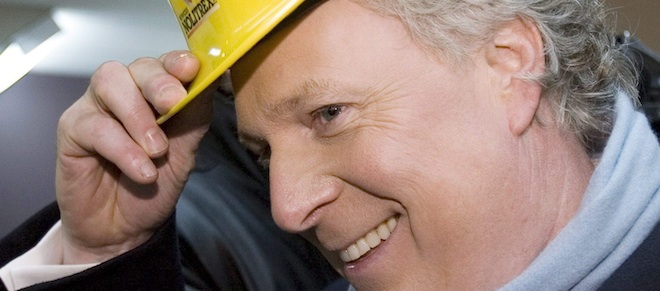Jean Charest, prospector
The Quebec premier’s Plan Nord promises to transform Quebec—into Alberta
Quebec Liberal Party Leader Jean Charest puts on a hard hat at the Nolitrex warehouse as he campaigns Thursday, Dec. 4, 2008, in Saguenay, Que. THE CANADIAN PRESS/Jacques Boissinot
Share

It was a tweet yesterday from Andrew McIntosh at QMI that finally got me thinking about what Jean Charest’s government is up to in Quebec’s north. I’ll cut to the chase: basically he’s turning it into Alberta.
What Andrew noticed was that, while most of the reporters in Quebec City were safely tucked away in the provincial budget lockup, Charest’s former chief of staff announced he will become an executive at Canada Lithium, which means he’ll be spending a lot of time in Abitibi setting up a mine that will provide 12% of the world’s lithium and, in return, make everybody rich as thieves.
There’s not a whiff of scandal to this. It’s good to see former government people getting honest work. (And the guy involved has been out of government for five years.) But Stéphane Bertrand’s new line of work reflects where things are going in Quebec these days. The whole province — or at least its teetering Liberal government and its investment community — is going resource-crazy.
I had heard, vaguely, about Charest’s “Plan Nord,” which he seems to spend a lot of time talking about, and which I mostly took to mean “don’t look at the construction-industry corruption scandal.” But as I may be the last to figure out, it’s actually a big deal. “Plan Nord” translates as “North Plan” — stop me if I get too technical — and it’s about developing the astonishing mineral wealth in the northern two-thirds of the province. As Charest puts it on the dedicated Plan Nord website, “The advances made by the emerging countries are shifting major economic corridors… The North’s mining potential affords us an opportunity to capitalize on the development of the emerging countries by ensuring the responsible development of the territory’s resources.”
There’s a bunch of other stuff about the environment and sharing the economic benefits with First Nations, but I stripped it down to the bit that sounds eerily like everything Stephen Harper has been doing since December. China needs stuff! We have stuff!
For a hint of the economic potential, check out how cuckoo for Cocoa Puffs the good folks at PriceWaterhouse Cooper have gone over the whole idea: “unique business opportunities for various organizations… help from our global network of industry specialists… position your business to benefit.” Multiply that by an awful lot of consulting, engineering, mining, construction and marketing talent. And good for the First Nations too! Apparently!
Charest’s finance minister delivered a budget Tuesday that features a million tweaks to the Plan Nord, designed mostly to protect Charest’s left flank by getting the government more actively into the investing and revenue-sharing. There’s a billion-dollar fund to make the government part-owner of various projects, a contestable move — equity share won’t bring in nearly the revenues that taxes would have anyway; state investment distorts everyone’s priority and exposes taxpayers to risk as well as reward — but on the other hand, maybe the government Quebec is due to invest in Quebec resource projects, since Quebec’s public-service pension fund is already into the Alberta oil sands for five times as much.
If Charest is counting on Quebec’s mineral resources to keep him in office, he must surely know it’s a long shot. The North is far away from a lot of voters’ preoccupations, the Parti Québécois says he’s being a bad environmentalist, and the great white hope of the Quebec free market, François Legault, says he’s not being statist enough. Which I would call “foreshadowing” except it’s already been clear for months that Legault goes wherever he thinks he needs to go.
But it’s hard to imagine a future Quebec government ignoring the potential revenue in those hills, with so few other bright spots in the provincial economy. The further into resource extraction future Quebec governments get, the harder it’ll be to peddle the kind of virtue that consists in decrying Albertans’ despoliation of the environment while losing a steady trickle of bright, entrepreneurial population westward.